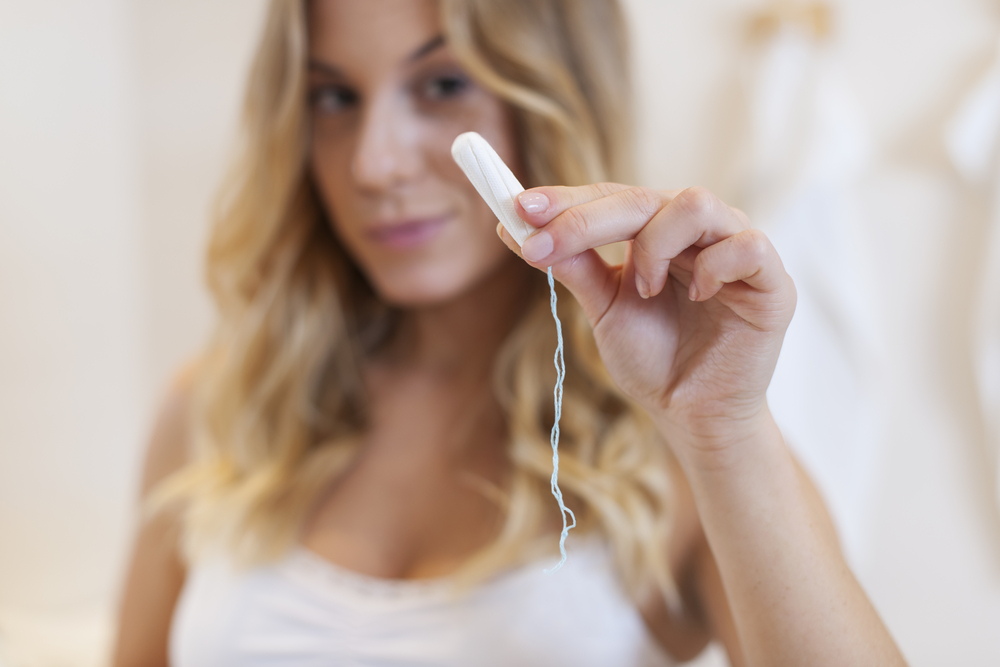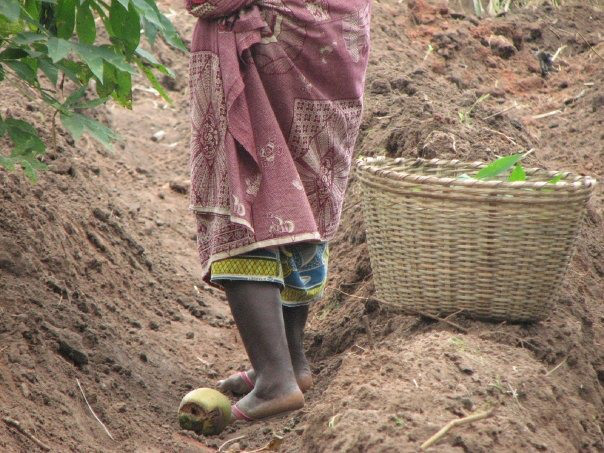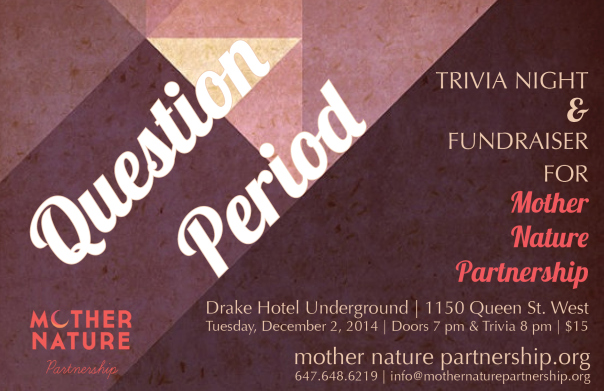Here in Canada, and really most of the developed world, we take a lot of things for granted. And while it may not be at the top of most people’s lists, dealing with our monthly visit from “Aunt Flow” is definitely one of them.
While our society understands that a woman’s period is just a part of life, other countries sometimes see it differently. The Mother Nature Partnership is an organization that is hosting Question Period, a fun event in December at the Drake Hotel Underground in Toronto. With celebrity co-hosts, Kristian Bruun of Orphan Black and Hannah Cheesman of The Animal Project, the aim is to help raise funds and awareness for those countries that may not understand menstrual cycles as fully as the Western world.
With a range of general knowledge and period related questions, teams of four will compete against each other during three rounds of trivia questions. The event’s goal is to raise enough funds to provide 1,000 girls with menstrual health programming at five high schools in Cameroon.
Every woman and girl in the world should be free to live her life to the fullest. In 2014, its programming, with funding from the Bill and Melinda Gates Foundation, provided 5,000 women in Cameroon with health information and reusable menstrual supplies so they could continue with their daily life within their communities. The result? Girls weren’t forced to miss school and women were allowed to continue to work to support themselves and their families during their period. Shocking, right? Yes, there are societies that deem periods as a disruption in life or even considered it a “dirty” part of a woman’s life.
I had a chance to chat with Alice Irene Whittaker-Cumming, Founder of Mother Nature Partnership about her organization and the upcoming event….
What are the common myths about periods from around the world?
The most common myth is that other countries – especially countries in the Global South – are somehow behind Canada in terms of cultural openness to menstruation. The truth is we have pervasive, powerful stigmas and taboos around menstruation in our own country, that extend so far that even women themselves find menstruation gross or are uncomfortable talking about it even with close friends. In a way, it is a unifier like many issues that women face, where challenges are global and span socioeconomic and geographic divides. At last, a unifier! Too bad it is a negative one. We are working to change that everywhere – in Cameroon, where we work, and also here in Canada.
What are some of the reactions when the educators meet with the women in other countries?
Women often remark that our workshops are the first time they have ever had an open forum with other women. This is very powerful. And important for women – for any person – that they have an open space where they can have honest conversations, where they can hear other people’s stories and be heard. Some of the women we work with are relegated to their home, to their family and to their job, and don’t have a lot of opportunity to converse openly with other women. Our workshops, beyond the focus on menstruation and menstrual care, create that space for dialogue, storytelling and questioning, which we think helps to normalize whatever a woman is going through and fosters solidarity among women. I know that’s what conversation with other women gives me.
What are they using during their periods?
Many women that we work with resort to using unhygienic (and no doubt, highly uncomfortable!) materials like newspapers, rags or mud. These makeshift items are not only unhealthy for the body – the inside of a woman’s vagina is the most absorptive place in the human body – they are also ineffective. So when a woman uses these materials and they inevitably fail her, she is forced to leave school or work or not go in the first place. When she is relegated to her home and misses essentially a quarter of active life outside of the home, she misses out on full participation in school, work and community life. Other women purchase Western commercial products that are prohibitively expensive, and of course a recurring expense that she can’t always afford on a tight budget. That’s why we believe reusable menstrual care supplies are so important for everyone: they are affordable, sustainable, hygienic, discrete and environmentally-friendly.
What reaction surprised you the most?
The women’s responses about our program surprised me, in how frank and joyful they are. Women express happiness at being able to ride their motorcycles without worry, talk about how nice it is to be able to work as much as they please and react really positively to our approach. That has been a wonderful surprise.
So what’s the purpose of this specific event?
There are three reasons for our Question Period event. First, it is really fun. The last one was so much fun, you didn’t even notice you were at a fundraiser. It is a trivia night and people get really competitive and engaged, and the night ends up being a riot.
But more than that, the ultimate goal is to raise funds for some very important work we are starting in January 2015, when we are expanding to include girls in our programming. We will be working with 1,000 teenaged girls from 5 high schools in Cameroon, and we couldn’t be more excited about working as partners with this group of young women, so that we can directly impact their lives by increasing comfort and health, reducing school absenteeism and building a foundation of knowledge and self-sufficiency. This is really exciting to us.
And finally, Question Period is a chance to talk about menstruation in an open forum here in Canada, and to make the topic fun and light instead of secretive and off-the-table. It is an important part of so many women’s lives, regardless of their relationship to their body and menstruation, and yet it is a forbidden topic in most settings. Question Period is a chance to joke about it, talk about it and deconstruct some of the stigma that surrounds it. As an example, our supporters are hilarious in their team names, coming up with brilliant monikers like The Wandering Menstruals, The Standing Ovulations and The C U Next Tuesdays. Much better to have a laugh than to feel isolated and stigmatized.
We often here funny names for our menstrual cycles like “Aunt Flow has come to visit” or “your monthly visitor” have you heard of any funny names in other countries?
We haven’t heard of any yet! No doubt we will hear of some good ones once we start working with high school girls in January 2015. I imagine they have some clever names to teach us.
The Question Period event looks like it will be a great night out for a great cause! Here are the details: MotherNaturePartnership.org



Leave a Reply